1. Do Not Use These Seven Forbidden Words
- Specialist/Specialize – unless you are certified as a specialist by your state bar or an organization approved by your state bar or the American Bar Association, you cannot use the word “specialize” or “specialist” to describe you or your services.
- Guarantee/Promise – not even the best attorneys can guarantee or promise results. Using this language sets unjustified expectations and violates a code of conduct, so avoid these words unless they refer specifically to something you can control 100% of the time. For example, if your client is not satisfied with your services, you will return their fee.
- Get/Obtain – although these words appear to be harmless, they can get a lawyer into serious trouble, especially when combined with “results.” If your internet marketing includes wording like, “We will get results for you,” it’s another example of setting unjustified expectations. Instead, use phrases such as, “We will work hard on your behalf throughout the entire process.”
- Results – when the word “Results” is used in slogans like “Experience, Dedication, Results,” this word is generally okay because it does not imply a specific outcome. However, avoid phrases like, “We work to obtain money for your injuries,” or “Our firm guarantees the results you deserve.” Do not talk about the results you will achieve for your clients. So long as it is the truth, you can write about past results or successes you have had with previous clients, e.g. “We’ve successfully represented thousands of clients,” or “We helped our client John achieve a six-figure settlement.”
- Most/Best/Top – unless you want to hear from the Bar about a complaint, do NOT use these words in your internet marketing. Why? It’s a comparison of your services to your competitors, which cannot be factually substantiated.
- Deserve – this one is murkier because there is no specific rule that prohibits its use. However, if you use it in the following way, you will most likely run afoul of Bar regulations: “We help clients obtain the money they deserve.” From the Bar’s perspective, using the word, “deserve,” in this way is misleading because it implies a promise to do something, and that everyone deserves to recover something. When referring to a settled case, you could say, “We helped our client Mary, seek to recover the money she deserved.”
- Expert – there is no ethics opinion that explicitly forbids the use of this word to describe your services but in your law firm’s best interest, we recommend avoiding it in your digital marketing. If you refer to yourself as an “expert,” you may be called upon to substantiate your claim. Instead, describe your law firm as “experienced,” “professional,” “knowledgeable,” and “responsive.”
2. Do Avoid False or Misleading Statements on Your Website
In our experience, most attorneys run the risk of violating their state bar’s rules governing internet marketing and advertising when explaining their fees, describing their abilities and areas of expertise, and promoting their past results with clients. As we mentioned in point #1 (above), false or misleading statements include hyperbolic descriptions of your law firm using words like “expert” or “specialist.” Forbidden, self-laudatory statements also include words like “better, “best,” and “cheapest.” To remain in compliance, stick to the truth. Everything published on your website and on social media must be factual. Keep in mind, in some states your years of experience as an attorney, client testimonials, endorsements, and previous case results can be considered false and misleading advertising. When in doubt, it’s best to check with your state Bar association before publishing any content online that could violate their code of ethics.
3. Do Assume Responsibility for Your Website Content If You Are the Attorney
In a general sense, internet marketing must include at least one named attorney as the party responsible for the content. This is another area where the requirements set forth by individual state Bar associations vary. In many states, the name of the responsible lawyer or law firm must be prominently displayed somewhere on their website, while in other states, the responsible party’s name must appear on the home page. To eliminate any possibility of violating your state bar’s code of ethics, we suggest that attorneys publish their name on every page of their website.
4. Do Publish Your Office Location or Address As Required
In reference to the geographic location of your law firm, it’s likely your jurisdiction has some requirements. For the most restrictive states, lawyers and law firms must publish the city or town of their firm’s principal location on their website’s home page. Adding links to the home page that takes a reader to another page where their geographic location is published will not satisfy this requirement. Other states forbid lawyers and law firms to advertise satellite office locations on their websites unless these locations meet one of the following criteria: they are staffed at least three days a week, the website clearly states the days and times the attorney is present at that location, or the website instructs the reader that meetings at that location are by appointment only.
DISCLAIMER
This Blog is not intended to be legal advice for a lawyer or law practice. No special relationship or privilege exists between you and the Blog and/or its owners, Law Firm Marketing Pros or its Affiliates (“LFMP”). LFMP IS NOT A LAW FIRM and THE AUTHOR IS NOT AN ATTORNEY. You will be representing yourself and your law practice in any legal matter you undertake or any Client you represent as a result of your use of the information provided in the Blog, including any Services offered through the Blog and content available on the Site the Blog is published on, and in all other matters relating to you and your businesses. This Blog may provide audio-video content, referenced articles, newsletters, and other content is for informational purposes only. In the process of providing this information, the Blog is engaged in the publication of information regarding business and management issues that may be commonly encountered by law firms. This blog is not a substitute for the advice of an attorney. This Blog does not review any of your answers to questions for sufficiency, provide legal advice, or analyze applicable law and apply it to your specific requirements. Accordingly, if you need legal advice for a specific issue, you are advised to seek the advice of your local, state and /or national Bar Association.
Do you still have questions about digital marketing? Schedule an appointment with us today at 561-948-5001. Click here to download one or more of our free tools, including a Digital Marketing Checklist for Law Firms.
Law Firm Marketing Pros
250 S. Central Blvd
JUPITER, FL, 33458
561-948-5001
https://lawfirmmarketingpros.com/
Copyright 2020. Law Firm Marketing Pros. All Rights Reserved







